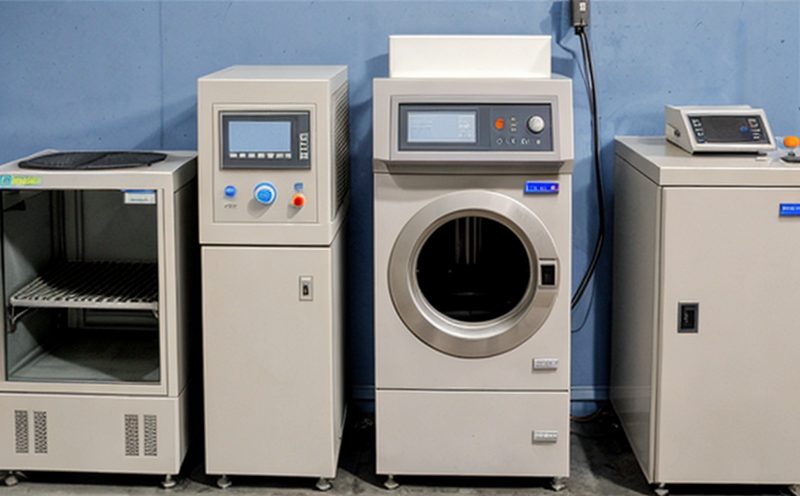EN 13274 Testing of Nanoparticle Penetration and Dispersion in Filters
The EN 13274 standard provides a method for the testing of nanoparticle penetration and dispersion within filtration systems, which is critical for ensuring air quality and occupational safety. This test evaluates how nanoparticles behave as they pass through filter media under controlled conditions. Compliance with this standard is crucial for industries such as healthcare, manufacturing, and research where high-purity environments are required.
The primary focus of EN 13274 lies in the dispersion and penetration characteristics of nanoparticles within filtration systems. The test protocol requires that a standardized suspension of nanoparticles is introduced into a filtration system, followed by careful monitoring to determine how effectively the filter retains or allows passage of these nanoparticles. This process involves precise measurement techniques to ensure accurate results.
The standard specifies detailed procedures for specimen preparation and testing conditions. Specimen preparation includes creating a stable nanoparticle dispersion that can be uniformly applied to the filter sample. Testing is conducted at specific flow rates, pressures, and time intervals to simulate real-world operating conditions. Reporting requirements emphasize the need for comprehensive data on particle retention efficiency, penetration levels, and distribution within the filter media.
Understanding EN 13274’s role in ensuring air quality and occupational safety underscores its importance across various sectors. For instance, in healthcare settings, accurate filtration is essential to prevent airborne transmission of pathogens or toxic substances. In manufacturing environments, it helps maintain optimal working conditions by minimizing exposure risks for employees.
The standard ensures that filtration systems perform consistently under diverse operational scenarios. By adhering to EN 13274, organizations can enhance their compliance efforts and demonstrate commitment to maintaining safe workspaces and protecting public health.
Why It Matters
The significance of EN 13274 testing cannot be overstated in today’s increasingly regulated industrial landscape. Compliance with this standard is not just about meeting legal requirements but also about safeguarding human health and environmental sustainability. The test results provide critical insights into the performance capabilities of filtration systems, which are vital for maintaining clean air in various applications.
For quality managers and compliance officers, understanding EN 13274 helps them make informed decisions regarding material selection and process optimization. It ensures that the chosen filtration methods are effective against even minute particles, thereby enhancing overall product reliability and safety.
R&D engineers benefit from this testing by gaining valuable data on how different materials interact with nanoparticles under varying conditions. This information is invaluable for developing new products or improving existing ones to meet stringent regulatory standards while ensuring superior performance.
In summary, EN 13274 plays a pivotal role in promoting safer workplaces and healthier environments through reliable filtration technology. Its implementation fosters trust among stakeholders by providing verifiable evidence of adherence to international best practices.
Industry Applications
| Industry Sector | Description |
|---|---|
| Healthcare | Inhalation safety, air quality control in hospitals and clinics. |
| Manufacturing | Avoidance of contamination in production lines. |
| Research Institutions | Ensuring controlled environments for sensitive experiments. |
The healthcare sector particularly relies on accurate filtration to protect patients and staff from airborne contaminants. By ensuring that air filters meet the stringent criteria outlined in EN 13274, hospitals can maintain sterile conditions essential for surgeries and other procedures where even small particles could pose significant risks.
In manufacturing environments, contamination is a major concern due to its potential impact on product quality and operational efficiency. Effective filtration systems help minimize particle intrusion into sensitive machinery and products, leading to improved output quality and reduced maintenance costs.
Research institutions also benefit greatly from EN 13274 testing as they often work in highly specialized environments requiring precise control over particulate matter levels. The standard ensures that researchers have access to reliable filtration solutions capable of handling the unique challenges posed by their work.
Use Cases and Application Examples
| Use Case | Description |
|---|---|
| Hospital Air Filtration | Evaluating the effectiveness of air filtration systems to prevent airborne infections. |
| Industrial Manufacturing | Avoiding contamination in manufacturing processes and products. |
| Laboratory Research | Ensuring controlled environments for sensitive experiments. |
In hospital settings, EN 13274 testing plays an integral role in assessing the performance of air filtration systems. Hospitals use these tests to ensure that the filters installed are capable of removing harmful pathogens and other airborne contaminants effectively. This is particularly important for preventing the spread of infectious diseases within healthcare facilities.
For industrial manufacturing, maintaining a clean environment is crucial for producing high-quality goods without introducing unwanted particles into the production process. By implementing EN 13274 compliant filters, manufacturers can significantly reduce defects and enhance productivity across all stages of production.
Laboratories often require controlled environments to conduct experiments accurately and consistently. Proper filtration ensures that researchers have access to uncontaminated samples and results, which is essential for obtaining reliable data and drawing valid conclusions from their studies.





